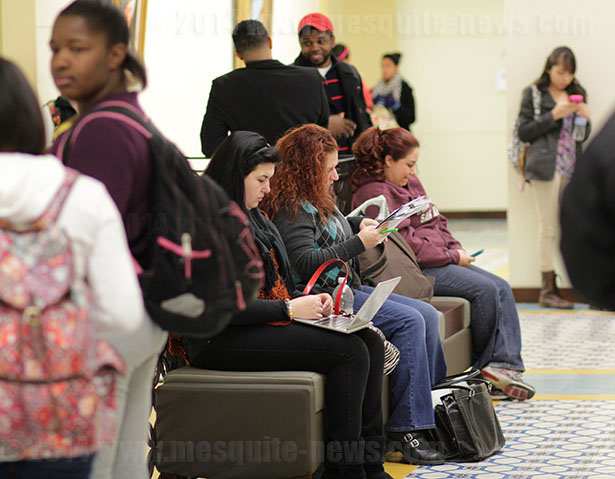
By Gladys Nunez
Update: The library offers workshops for students to succeed academically. For more information, visit http://tamusa.libcal.com/.
A White House summit last month focused on expanding college access and making sure low-income students graduate from college.
Most students here qualify for that sort of support, so Texas A&M-San Antonio has a vital interest in expanding opportunities and providing mentoring along the way.
The summit challenges hit home this university, especially for faculty who design programs for early intervention and peer mentoring. For some, the summit reinforced the need to continue to help students.
On Jan. 16, President Barack Obama met with 140 higher education leaders from private and public universities, representatives of community colleges and leaders from foundations, non-profits and organizations.
Four Texas institutions committed to expanding college access: El Paso Community College, Texas Association of Community Colleges, University of Houston and University of Texas at Austin.
An education service center, ESC GEAR UP, also made educational commitments to better serve its partnership with middle and high schools, universities and school related businesses.
Those who attended the summit made over 100 commitments dedicated to expanding college opportunity. College leaders committed to strengthen one of four key areas vital to college opportunity.
According to a fact sheet made available by the White House, the four areas are: “connecting more low-income students to the college that is right for them and ensuring more graduate; increasing the pool of students preparing for college through early interventions; leveling the playing field in college advising and SAT/ACT test preparation; and strengthening remediation to help academically underprepared students progress through and complete college.”
While none of this university’s faculty attended the summit, some found connections between the summit and services they provide to students.
Dr. Nancy Garcia, bilingual education assistant professor, authored a proposal for a mentoring program called INSPIRE, which received $5,000 in funding. The department of bilingual education’s mentoring grant program, funded by the office of student affairs, will launch once funding is awarded.
The program serves “to meet the needs of predominantly Latino student populations and to improve education opportunities for them.” Planning for the program began two years ago, Garcia said. The funding connects to the summit because the program will help open up opportunities for students.
For Garcia, the summit confirmed what faculty do here matches with what the university hopes to provide for students.
“I’m glad that it’s happening,” she said. “I think that really creates opportunities to discuss how we best meet the needs [of students].”
The INSPIRE grant will pay for at least five to eight students to mentor the same amount of incoming students.
The major objectives include mentoring, motivation, academic assistance, and cultural awareness.
Garcia said she sees a connection between the major goals of the summit and some of the programs here that support low-income students.
After reviewing the data released earlier this month, Garcia said, “This is amazing because some of the programs that we have in place at our university are very much supported by everything the data is saying that other universities are needing… so I was just glad that we were right on track.”
She added that we need to involve our students more by providing scholarships and opportunities.
Though A&M-San Antonio had no representative at this year’s summit, Garcia met with President Maria Hernandez Ferrier to encourage the university to attend next year.
While there is not a formal application for universities to attend, Garcia said the administration “is putting together goals and commitments” to potentially gain access and send university representatives to Washington, D.C.
Students mentoring students
Students at the university say they are doing their part to make sure junior and senior-level transfer students have the assistance and mentoring they need.
Bilingual generalist senior Alejandra Valerio is one of the first student mentors as part of the INSPIRE mentoring program.
“When I started school here we didn’t have anything like that and it would have been nice to have that guidance, so I figured that I would like to help other students who are just coming in maybe make the transition or the journey a little bit smoother,” Valerio said.
Along with the INSPIRE mentoring program, other resources are available to help students at the university that are in line with the objectives set forth at the educational summit.
In the area of helping students who are academically underprepared graduate from college, members of the university staff said they are in agreement with other institutions’ commitments.
For example, the department of student counseling and wellness puts on the JAGs Workshops 4 p.m. Monday at Main Campus Building and 5:30 p.m. Tuesday at Brooks-City Base Campus. These workshops will be offered through April 7.
Kathleen Frank, a counselor in student counseling and wellness, said an average of 140 to 160 students attend the workshops per semester.
“[We have the workshops] to increase student awareness in any personal issues that may be going on,” Frank said. “Mainly to help students with their academic progress and to help them get a better understanding of where [their] weaknesses and strengths are…For every student it is different, depending on what they have going on.”
Frank said students appreciate the help they get.
“The feedback that we get from students is that the programs are very helpful and that they wish they would have gone through something like this their first semester here,” Frank said.
Frank said students benefited from one-on-one conversations and the workshops.
There are other programs the university offers like tutoring services, disability support services, and the counseling and wellness department.
Valerio believes the university has good resources for students but since the university is growing at a rapid pace, it could give the impression that there is not enough help for everyone.
“I think having a program like this will help because the students that are being mentored, they can also share that information with their fellow classmates even if they didn’t get to participate in the program. It just gets the information out in a more efficient way I think,” Valero said.
“When we start to look at the nation as a whole, I think that we see that there is a great need for low income students,” Garcia said.





